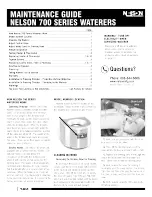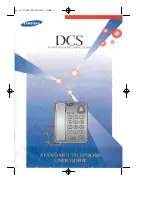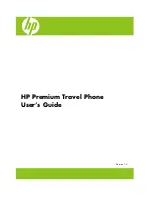
SX-200 General Information Guide
120
Revision A
50003510
The caller’s COS and COR can be changed (traveling class of service) when a valid Account
Code is entered. This can give the caller access to different features and external call privileges.
If the caller’s COS is changed and the Direct to ARS feature is enabled in the COS, the Direct
to ARS feature operates immediately.
Each Verified Account Code has an active/inactive status. This allows accounts to be denied
access when problems are encountered such as nonpayment of billings. See also Account
Codes - Verified (Special DISA), Resale Package, Trunk Operation (DISA) and Analog
Networking.
Account Codes - Verified (Special DISA)
Verified Account Codes can be used to replace the DISA Access Code. A caller who accesses
a Special DISA trunk must dial an Account Code rather than the DISA Code. By using a Verified
Account Code, each DISA trunk can have access to its own COS options through the COS and
COR associated with the Account Code. SMDR records each of these calls.
Add Held
Add Held allows a user engaged in an active call on a SUPERSET display telephone to add a
call that is on hold on another line, to the current line.
Analog Networking
Analog Networking allows an SX-200 EL and SX-200 ML systems to send and receive caller
information over a private network. The other nodes in the network can be any combination of
Mitel Networks SX-200 PBXs and SX-2000 INTEGRATED COMMUNICATIONS™ systems.
Analog Networking uses the ARS Modified Digit feature to insert feature access codes and
other codes (called information elements) into the outgoing digit string. The information
elements consist of special codes for inserting the caller’s Extension Number, Account Code,
and Node Identification.
The system with Analog Networking can function as an end node, an intermediate node, or a
hub. As an end node, network elements are transmitted into the network via DTMF digits. As
an intermediate node, all information elements received by the intermediate node are passed
on to the next node. As a hub, the system receives information elements to provide Calling
Party Identification.
The information elements are
•
Caller’s Extension Number
This element is displayed on consoles and SUPERSET display telephones. When the call is
answered, the Caller’s Extension Number replaces the trunk number or trunk name. The Caller’s
Extension Number also replaces the trunk number in SMDR records.
•
Caller’s Dialed Account Code
The existing account code access code identifies the beginning of a Caller’s Dialed Account
Code. The Account Code is written into the SMDR record associated with the call. Verified
Account Codes can be used to implement Travelling Class Marks by providing a COS and COR
Summary of Contents for SX-2000 EL
Page 1: ...GENERAL INFORMATION GUIDE LIGHTWARE 19 RELEASE 3 1 ...
Page 14: ...xiv Revision A 50003510 SX 200 General Information Guide ...
Page 34: ...SX 200 General Information Guide 20 Revision A 50003510 ...
Page 61: ...Configuration 50003510 Revision A 47 SX 200 ML Configuration Example ...
Page 114: ...SX 200 General Information Guide 100 Revision A 50003510 ...
Page 214: ...SX 200 General Information Guide 200 Revision A 50003510 ...
Page 226: ...SX 200 General Information Guide 212 Revision A 50003510 ...
Page 257: ...Glossary of Terms 50003510 Revision A 243 NOTES ...
















































